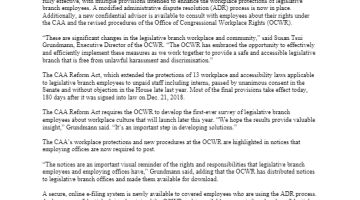Washington, DC – As of today, the Congressional Accountability Act of 1995 (CAA) Reform Act is fully effective, with multiple provisions intended to enhance the workplace protections of legislative branch employees. A modified administrative dispute resolution (ADR) process is now in place. Additionally, a new confidential advisor is available to consult with employees about their rights under the CAA and the revised procedures of the Office of Congressional Workplace Rights (OCWR).
“These are significant changes in the legislative branch workplace and community,” said Susan Tsui Grundmann, Executive Director of the OCWR. “The OCWR has embraced the opportunity to effectively and efficiently implement these measures as we work together to provide a safe and accessible legislative branch that is free from unlawful harassment and discrimination.”
The CAA Reform Act, which extended the protections of 13 workplace and accessibility laws applicable to legislative branch employees to unpaid staff including interns, passed by unanimous consent in the Senate and without objection in the House late last year. Most of the final provisions take effect today, 180 days after it was signed into law on Dec. 21, 2018.
The CAA Reform Act requires the OCWR to develop the first-ever survey of legislative branch employees about workplace culture that will launch later this year. “We hope the results provide valuable insight,” Grundmann said. “It’s an important step in developing solutions.”
The CAA’s workplace protections and new procedures at the OCWR are highlighted in notices that employing offices are now required to post.
“The notices are an important visual reminder of the rights and responsibilities that legislative branch employees and employing offices have,” Grundmann said, adding that the OCWR has distributed notices to legislative branch offices and made them available for download.
A secure, online e-filing system is newly available to covered employees who are using the ADR process. And a new confidential advisor has joined the OCWR and is available, on a privileged and confidential basis, to discuss with employees information relating to workplace concerns, and inform them of their rights and options under the law. The confidential advisor is not a representative, but may assist employees in drafting claims that will be filed at the OCWR.

